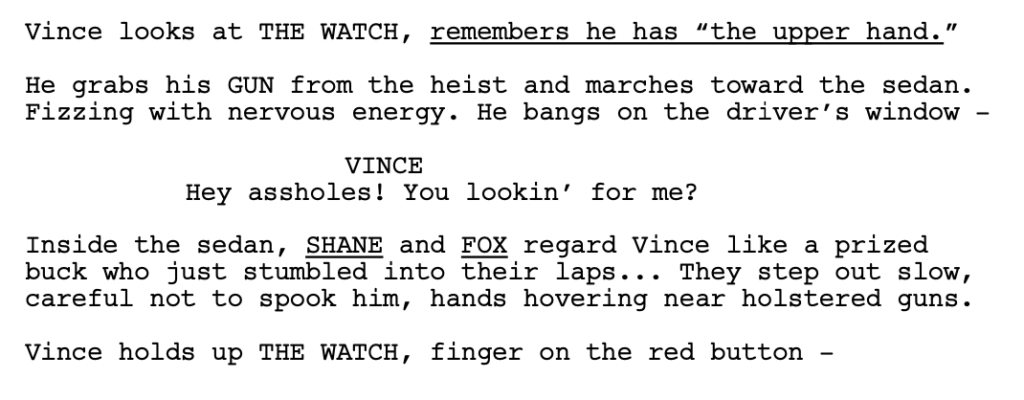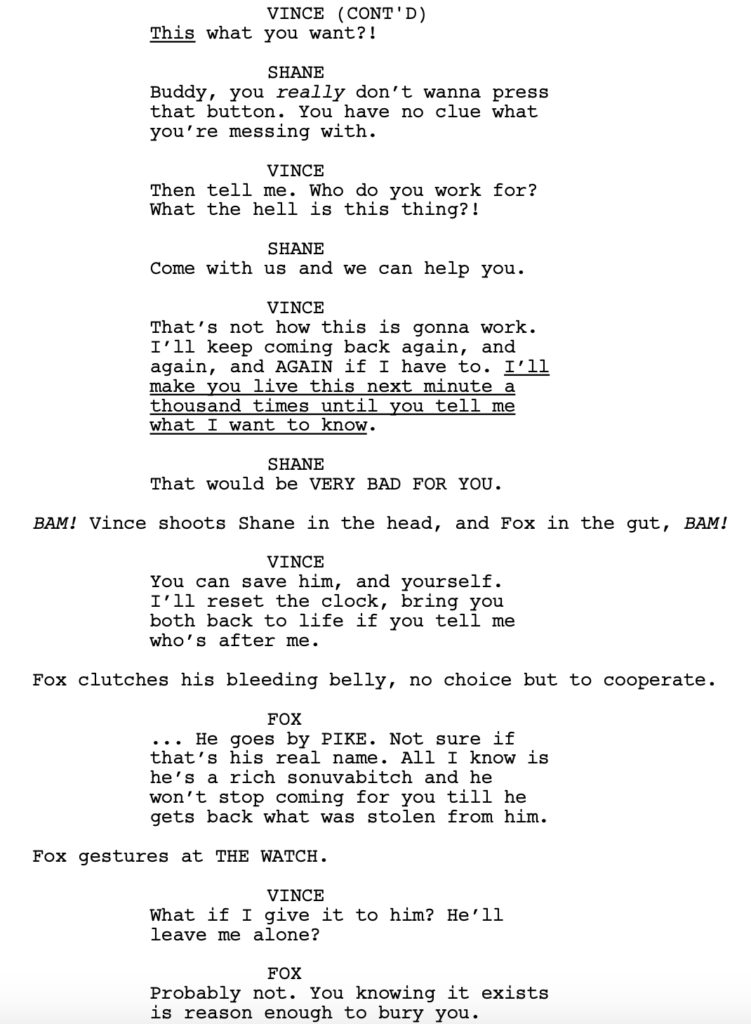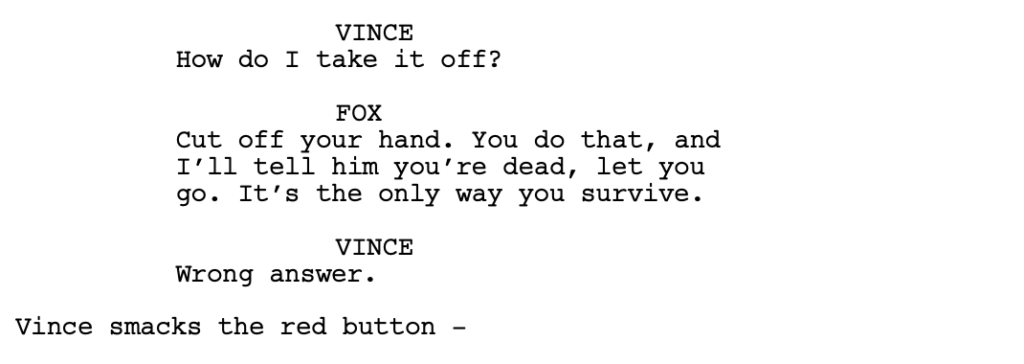Is today’s screenplay the spec script return of the slick high-concept sci-fi thriller?
Genre: Sci-Fi Thriller
Premise: A down-on-his-luck former getaway driver comes into possession of a mysterious watch that allows the user to go back in time by one minute. As he starts to uncover its uses and gets pulled into one last heist by his former crew, a dangerous group after the technology gets on his tail and will stop at nothing to get the watch back.
About: Today’s writer just got his first produced credit this year, with “Murder City.” “Undo” seems to cover similar ground… but with time travel! Simmons’s script finished on last year’s Black List.
Writer: Will Simmons
Details: 110 pages
 Michael B. Jordan and his cool shirt for Vince?
Michael B. Jordan and his cool shirt for Vince?
Thank Hootie and the Blowfish for this next tip. When it comes to writing high-concept stuff, one of your biggest allies is time. Time provides the key, not only to an unlimited number of high concept ideas, but to ideas that are cheap to produce, and therefore compelling to producers.
From going back in time to going forward in time to looping time to condensing time. There was that sci-fi script that sold to Amazon where future cops use a process of slowing down time by as much as 5000% at active crime scenes in order to take down the bad guys.
“Time why you punish me. Like a wave bashing into the shore. You wash away my dreams.” Poignant, Hootie. Poignant, indeed.
Vince is a former NASCAR driver. The only oil he changes these days is for his Toyota Prius to make sure he’s good to go for his next Uber drive. Yes, Vince is now an Uber driver. Sadly, the only joy he gets is in trying to find faster routes than the ones Google Maps assigns him.
Vince is perpetually late, which his girlfriend has had enough of. When he isn’t able to get her to her flight on time, she dumps him. While still at the airport, a scategorical Russian man named Gene lands in Vince’s car and gives him 300 bucks cash to “drive.”
Not long after they leave the airport, a truck starts bashing Vince’s poor Prius. A man in the truck pulls a gun and shoots Vince dead. But then Gene presses a button on a special watch he’s wearing and we go back in time 60 seconds. This time Gene is able to warn Vince about the gun, which helps Vince survive.
But only temporarily. The truck collides with the Prius again, badly injuring Gene. With his dying breath, he takes the special watch off, puts it on Vince’s wrist (where it locks onto him), and tells Vince to “find Anna.” Gene dies and Vince slams his petal to the metal.
Vince is able to get to his old criminal buddy, Benji’s, house. Benji will allow him to store the car with the dead body here only if Vince agrees to be the wheelman in Benji’s next Brink’s truck heist. Vince reluctantly agrees (what choice does he have?) And off they go. But the heist is a setup. The entire car full of Benji’s team is slaughtered. Except that Vince is able to reverse time and escape.
Benji is now freaked out and kicks Vince out of his home. That’s when Vince realizes, “Wait a minute, I control time!” So he goes to the nearest casino and starts racking up cash. It’s there where he meets Pike, the guy who funded Gene’s research. Pike wants that watch back. And he’ll do anything to get it. Can Vince use the one ace up his sleeve (1 minute rewinds) to escape Pike? Or is Vince in way over his head?
“Undo” is a script I would’ve written when I first started screenwriting.
It’s so far in my lane that I may as well be using Bentley-level cruise control.
But Simmons makes some of the same mistakes I used to make with these scripts, the first of which is being too casual with the execution.
Any time you’re asking the reader to accept a fake reality that you’ve created, you run the risk of them not buying what you’re selling. Usually, what does you in, is being too casual with the execution.
Take, for example, a scene from the first act where Benji recruits Vince to be the driver in his latest heist. When the rest of the crew shows up, one of them says, wow, we’re so lucky. Vince is the best wheelman in the world.
IN THE WORLD!
That’s a pretty big statement, right?
Except that four scenes earlier, we watched Vince RUN OUT OF GAS while trying to get his girlfriend to the airport. I don’t know much about being a getaway driver. But I’m pretty sure that if I was a good getaway driver, one of the things I’d probably monitor is THE GAS!!!!!
That was a minor thing though.
This next one was major.
Benji initially freaks out when Vince shows up with a dead guy in his car. Benji wants to know how long ago Vince lost his tail so that he can be sure no one’s followed him here. Vince tells him it was miles ago, he’s clear, and so Benji lets him in.
They then start doing research on Gene (the dead guy) and find out he’s FORMER KGB!!!! What’s Benji’s reaction to this? He shrugs his shoulders. Hmm, that’s interesting. Doesn’t bat an eye.
Let me think out loud here for a second. A minute ago, Benji was worried about some second-tier street thug maybe following Vince and figuring out where Benji lives. But Benji has no problems with a DEAD KGB AGENT IN HIS HOME?????!!! I’m thinking on the scale of “this is a problem,” that’s about a million times worse than a Latin King.
When the writer doesn’t consider these things, it bothers me. Because it tells me he’s not really living in the world of his screenplay. He’s more concerned with moving the plot along. It’s too casual. And casual execution kills.
The real reason people are coming to see this movie, though, is to see it deliver on the promise of its premise. Do we get cool “can’t see’em in any other movie” sequences involving this one-minute time jump?
I would say the script does okay in this department. I’m always looking for those 2-3 scenes that really knock it out of the park – scenes that I could never have thought of in a million years. Cause that’s when you know the writer is really dialed into his premise. He’s seeing it in ways nobody else sees it.
Which should be the case for every script ever written. The writer should be so entrenched in his idea, that he’s already thought of the 30 different scenes that the average writer would’ve thought up regarding the 1-minute time jump and not used any. Because he’s going deeper. He’s going to give you the stuff nobody would’ve thought of.
There’s a scene in the second act where Vince charges up on two of Pike’s guys sitting outside of his home, catching them off-guard. Vince still doesn’t know the rules of this world yet or what’s going on.



To me, this was the best exploration of the premise in the script. It felt like we were genuinely using the 1 minute time loop in a clever way.
But after that, all the uses of the loop were expected, which basically boils down to a bunch of times where Vince is dying after getting shot and then getting one more minute back. There was one other interesting scenario where Vince was getting attacked on all sides, wherever he ran, so he barely escapes a gun to his head, gets outside, gets nearly killed there as well, and he has to make a decision because, if he goes back in time one minute, it will be where the guy has a gun to his head. So he’s dead either way.
THAT stuff I like. Because any time you give your character a choice where both options are bad, audiences are interested in seeing which one he chooses.
I know I’m beating a dead horse here but the way that you separate yourself from the pack is not to take a fun premise and execute it averagely. Or slightly above-average. The way to separate yourself is to do the hard work and really come up with the kind of execution that knocks the reader out. Makes them say, ‘Whoa’ every ten pages, a la Keanu Reeves. I never got the sense that Simmons gave me everything he had. So even though this was a decent script, it wasn’t for me.
[ ] What the hell did I just read?
[x] wasn’t for me
[ ] worth the read
[ ] impressive
[ ] genius
What I learned: A scene that will always work is to give your character a choice where both options are bad. The higher the stakes of the choice, the more compelling the scenario will be. Too many writers give their characters choices where there’s a good choice and a bad choice. How interesting is that? If we know what the character is going to choose, you haven’t made both options bad enough. You want to create the kind of choice where *you’re* not even sure which option you would choose.
Is “Suits” a perfectly constructed pilot?

Recently, I read an article that the two biggest streaming shows in America were Gray’s Anatomy and NCIS.
I’ve never personally met anyone who’s seen an episode of NCIS so, naturally, this was confusing to me.
I was also confused when, amidst a bottomless pit of shows on Netflix, many of which have had giant advertising campaigns, that the show that had become the most popular was one that had ended four years ago, “Suits.”
We have been led to believe that the TV landscape is dominated by prestige television shows such as Breaking Bad, Succession, Game of Thrones, and White Lotus. But the reality is, shows like Gray’s Anatomy, NCIS, and, yes, Suits, are the shows that truly get the ratings. Just not the love.
I decided to find out for myself if Suits was worthy of all the hype or if it was merely a curiosity brought about by the world’s obsession with Megan Markle (who plays a major character on the show). What follows are my thoughts.
Suits is set in New York City and follows a law firm led by Jessica Pearson, who’s trying to figure out if she should hand the firm down to her best lawyer, Harvey Specter. The problem is Harvey (a young George Clooney doppelgänger) is an arrogant blowhard who only cares about himself.
Harvey is on the lookout for a new lawyer, which is where Mike Ross comes in. Mike is a super-genius who’s had his life derailed by a couple of bad decisions and is in such a bad place that he actually agrees to deliver a suitcase full of drugs for money (that he plans to use for his sick grandmother, of course).
Mike goes to a hotel to make the drop but susses out that he’s being set up and makes a run for it… right into Harvey’s lawyer interviews. Mike stumbles his way into Harvey’s office where he accidentally opens the suitcase and all the drugs fall out.
Intrigued, Harvey asks Mike why he has a suitcase full of drugs and Mike tells him the truth. Further discussions lead Harvey to learn that Mike is beyond a genius and could run circles around all the Harvard applicants in the lobby. The kid is so raw, Harvey almost turns him away. But, in the end, he decides to take a chance on him. This leads to Mike’s first big case, a sexual harassment lawsuit.

Let’s cut to the chase.
Good writing is good writing is good writing.
It’s what I always tell people. Good writing prevails above all. It is almost impossible to find something that’s well written and completely ignored. Because good writing is rare. So when it arrives, it tends to birth a good product.
When it comes to TV, there are three writing ingredients that must thrive. The characters, the dialogue, and conflict. If you are good at these three things, you will be good at writing for television.
Cause TV isn’t so much about plot. Especially episodic shows like this one (case of the week). Plot is more for movies. The reason for that is, a movie needs a conclusion. And that’s where plot leads us. It gives us a goal and then, at the end of the story, we either succeed or fail at achieving that goal.
TV doesn’t need to end. It keeps going. So while there is plot in each individual episode (try to win the case), the plots are devoid of the kind of stakes that really matter. Cause who cares if Harvey and Mike win this week’s sexual harassment case? There’s going to be another one, just like it, next week.
For that reason, audiences come to TV shows more to hang out with the characters. Which is why all your TV writing should start with creating great characters.
Mike is a perfect character. Why? Two reasons. He’s an underdog and he’s super smart. These are two things that audiences DIE FOR. They love underdogs more than anything. This guy who didn’t even graduate law school being thrown into one of the biggest firms in New York — we love watching sh*t like that.
On top of that, audiences love characters who are smarter than everyone. There’s an early scene where Mike sniffs out that two men in the hallway (pretending to look like a bellhop and a guest) may be cops and he’s been set up with this drug delivery. So he asks the bellhop, “Hey, I was thinking about taking a dip later. How’s the pool here?” “It’s one of the best in the city, sir. You’ll love it.” Then we do a quick flashback of Mike earlier walking past the pool and a sign that says, “Pool closed for the summer.”
So we immediately know that Mike is smart. He uses his power of observation to stay ahead of everyone.
Then you have Harvey. I still don’t know exactly what the line is between hateable a$$hole and lovable a$$hole, but I know that audiences love lovable a$$holes. As long as the a$$hole is on our side.
One trick I’ve learned is to put our lovable a$$hole in the room with people who are worse than him. There’s an early scene where a client tries to railroad Harvey for not getting him everything he wants in their deal. But Harvey stays calm and outsmarts the guy, winning the conversation. In other words, if your hero is a bully and you want to make him likable, just add a bigger bully.
When it comes to dialogue, one thing I’ve noticed that these episodic TV shows live by is metaphors. They’re always using metaphors in the dialogue, which helps make the dialogue clever.
So, in the above scene where the client yells at Harvey, Harvey takes out a receipt of funds transferred and tells the guy that any threat to terminate their contract doesn’t matter because the firm has already received his money. The guy huffs out and it’s revealed that the piece of paper was a pointless memo. Harvey was lying.
Harvey’s boss then asks him, “How did you know he wouldn’t look closer and realize you were lying?”
Think for a second how you would write Harvey’s response. Because most beginner writers would write something like, “He’s a bully. And bullies never look closely at the details.”
It’s a lame lifeless line.
Here’s the line that Harvey actually uses in the pilot: “Cause a charging bull always looks at the cape, never the man with the sword.”
Now, is this the most brilliant line in the world? No. But it’s better than, “He’s a bully. And bullies never look closely at the details.” The metaphor automatically upgrades the line into something with more pop.
With TV, you really have to be on your dialogue game. If you are not a dialogue person, definitely stay away from this medium. It’s easier to get away with a lack of dialogue prowess in features because features are more plot driven, depend on exposition more (which is more technical), and are more about showing as opposed to telling. So you don’t have to write as much dialogue if you don’t want to.
Finally, we have conflict. Conflict is very simple to create. You put two people in a room who don’t see eye-to-eye, either about what’s happening in the moment, or in how they view the world in general. Or you give characters little goals and then throw obstacles in front of those goals.
The reason obstacles are great is not just to create conflict – which they do – but because they give your characters opportunities to shine, which is both entertaining and make us like the character more.
So that moment where Mike walks up in the hotel hallway and sees the bellhop and the fake guest — that’s an obstacle. Notice how Mike using the “is the pool open” bait shows him dealing with the obstacle in a clever way, which makes us like him more. The cops-in-disguise then chase him, which is where the conflict comes from.
Also, in the very next scene, when Mike interviews with Harvey, there’s conflict in that scene as well. Harvey clearly likes Mike. But he can’t hire someone who hasn’t even graduated law school. So there’s this tug-of-war where he challenges Mike with a series of problems that Mike passes one by one. Mike eventually wins him over and the conflict is resolved.
So if you’re good at these three things – character, dialogue, conflict – you can be a TV writer. And Suits is a great show to study for how to do it right.
[ ] What the hell did I just stream?
[ ] wasn’t for me
[ ] worth the stream
[x] impressive
[ ] genius
What I learned: I don’t know if there’s a better setup than taking someone who’s perceived as “not intelligent” (or who has street smarts, or who does things differently than you’re supposed to) and putting them in a scenario where they’re competing against the “smartest people in that industry.” It’s built perfectly for us to feel a sense of satisfaction every week when our supposedly “dumb” hero outsmarts the “smart” guys once again.
I’ve got a big fat juicy newsletter that’s going to get you salivating over screenwriting in a way that’s illegal in Canada. We’ve got the surprise September Showdown announcement. We’ve got a nuanced conversation about how many scripts you should be writing. I take on Ahsoka (and the Star Wars brand along with it). I ask the question we’ve all been wondering: Is Keanu Reeves a secret screenwriting genius? There are a couple of new trailers out that caught me by surprise. The new guard of filmmakers and artists has definitely arrived. But is the old guard ready to give up their seats?
If you’re not on my newsletter list, e-mail me at carsonreeves1@gmail.com and I’ll put you on!
Genre: Thriller
Winning Logline: When her estranged son returns and takes her grandson in the night, a veteran park ranger sets out to rescue him from the clutches of a mysterious cult deep in the Oregon woods.
About: This is the winner of the August Logline Showdown! If you missed it, you can check out all the contestants here.
Writer: Megan Carroll (story by Martin Hilligoss and Megan Carroll)
Details: 99 pages
 Sigourney Weaver for Vick?
Sigourney Weaver for Vick?
Remember that I’m announcing next month’s surprise showdown in the September newsletter, which is coming out tonight (Friday). If you want to know what the mysterious showdown is going to be (it’s not loglines) make sure to e-mail me and get on the newsletter list (carsonreeves1@gmail.com).
Onto the review!
People always ask me, “Carson, why do we have to write loglines?” The answer is that, in addition to making it quick and easy to understand if your script is something people might want to read, a well-written logline is a reliable indication that the writer has been around for a while and knows how to write.
That’s because writing loglines is hard. As in, it takes YEARS to learn how to write them well. It takes that long because you only practice writing loglines once every six months, after you’ve finished writing your most recent screenplay. Therefore, if you’ve figured out how to write a good logline, chances are you’ve been around long enough to learn how to write a good screenplay.
This logline felt professional to me from the jump so I’m not surprised it won.
Let’s see if it, indeed, indicates the writer can write!
60-something Vick lives in a small Oregon town with 8 year-old Jordy, her grandson. Jordy’s parents, Lee and Shaina, were drug addicts, and therefore had to give Vick custody to their son years ago. They’ve since disappeared.
That is until today, when Lee shows up at Vick’s door, three years since the last time he saw her or Jordy. Lee is unshaven and dressed in dirty clothes. He lives deep in the Oregon forest in a community called “Paradise” with his wife (Jordy’s mom), Shaina. Paradise is run by a woman named Cousin.
Vick senses there’s still good in her son and invites him to stay the night. Mistake. When she wakes up the next morning, Lee and Jordy are gone.
Due to a complicated history with the local cops, Vick decides to go into the woods and get her grandson back on her own. As a woman of a certain age, it isn’t easy hiking through the dense Oregon forest. But she meets a few helpful people along the way before spotting a couple of Paradise residents.
She follows them and when they discover her, she pretends to be a “Paradise” convert, eager to join the community. They bring her back where she meets Cousin, who seems to like her until Lee and Jordy spot her. Jordy leaps up and runs to his grandma, leaving everyone unsure of how Cousin is going to handle this.
Cousin is, strangely, calm, and invites Vick to stick around for the ‘big event’ tomorrow. What big event is that? Well, let’s do some math here. Crazy cult leader lady. Middle of forest. Bunch of followers who walk around like zombies. Yeah, I think we’re in ‘sacrifice’ territory here. But who’s going to get sacrificed? And will there be an opportunity to rescue Jordy before this sacrifice occurs?
So, when I had the Last Great Screenwriting Contest, one of the scripts that came out of that contest was a cult script. It was about a couple who were in a cult with a really scary leader. It was very well-written. But when I started sending it around town, I kept getting the same feedback, which was that these cult scripts are everywhere. A lot of writers write them and they all kind of feel the same, like a low-budget mumblecore indie version of something that would play at a second-tier film festival.
So, if you’re going to write one of these, you have to find an angle that doesn’t put it squarely in the above box.
I don’t think Wayward Son quite got out of the box. But it came close.
The thriller elements – the stakes, the urgency – definitely gave this a different feel than the cult script I read for The Last Great Screenwriting Contest. But there’s something about these cult scripts that always feels like they’re pulling punches. There’s horror right around the corner. But it’s never in your face.
And I get it. These scripts are often building towards some shocking ending. True to form, Wayward Son’s best moments occur during its third act. But in screenwriting, it’s not just about nailing the ending. You have to get the reader there in the first place. If they think they’re reading something that’s too tame, they’ll check out. And Wayward Son constantly flirts with being too tame.
Let’s talk about the opening sequence. Because I think the writer missed an opportunity there to capitalize on a gut punch, something that would’ve really pulled the reader in. When Lee first shows up to Vick’s, he’s calm and he’s nice, if a little awkward. They talk, they have pizza, they go to sleep, and then the next morning Lee and Jordy are gone.
What I think the writer should’ve done is have Lee show up, he’s nice and calm, they chat for a while, they talk about Jordy, she invites Lee to stay the night, and then, in the blink of an eye, he should’ve pulled a knife and slashed Vick’s throat, then taken Jordy.
You may say, “But then who looks for Jordy?” A cop! Have a cop look. Or, if you want to keep it in the family, maybe it’s Lee’s sister (Jordy’s aunt) who looks. Or maybe Vick and her husband are divorced. He’s a retired cop so he goes after Jordy.
You would’ve gotten that “Holy sh*t” moment in there to hook the reader. And then they’re in the palm of your hand for the next 90 minutes.
Another issue here is that the second act is the worst act. This is the act where Vick is traveling through the forest trying to find Paradise. I couldn’t figure out what the angle was here. Was it about how an old woman was doing something she wasn’t physically able to do anymore? It all just seemed rather tame. She’d meet some woman, they’d chat, she’d keep walking. She’d meet a man, they’d chat, she’d keep walking. Where are the teeth in this story? Why aren’t things getting gnarly?? At least ONE THING. Grab us by the throat. Give us a reason to continue to give you our undivided attention.
Carroll misses an opportunity in that second act when Machete and Kindling, the two Paradise residents who catch Vick following them, interrogate her. Vick lays a sympathy story on them about looking for meaning in life, which results in them taking her to Paradise.
30 pages earlier, we had the weakest scene in the script. Vick runs across a woman who’s clearly homeless and down on her luck and is in the beginning stages of trying to survive in the forest. Vick kind of feels bad for her situation but has more pressing problems to solve. So she leaves her. It’s, essentially, a pointless scene.
However, if that woman would’ve given Vick a specific story about how her life fell apart and a specific story about learning to find meaning by living off the land, now we could’ve used this scene as a setup to that Machete and Kindling interrogation. “Why are you in the forest? What are you doing here?” Vick could’ve then used, verbatim, what the homeless woman had said to her, and since it was so authentic, it would’ve been convincing to Machete and Kindling, who are moved by her story and take her in. That would’ve made Vick look sooooooooo clever. Plus, that seemingly boring scene becomes retroactively awesome.
Despite these criticisms, this script is very well-written. It moves fast. And best of all, it has some really strong character work in it. The complicated relationship Vick has with her son leads to a rescue story that is more layered than we’re used to. And, of course, you’re always going to get me on board when you build key character moments around Star Wars movies, which this does successfully.
When you put it all together, this is DEFINITELY one of the better amateur scripts I’ve reviewed on the site. If we ever do make a Top 25 Amateur Script List here on Scriptshadow, this will be on it. It’s worth reading.
Script Link: Wayward Son
[ ] What the hell did I just read?
[ ] wasn’t for me
[xx] worth the read
[ ] impressive
[ ] genius
What I learned: Think three-dimensionally to solve screenplay problems. Let’s go back to my earlier suggestion of Lee killing Vick in the opening scene. I could see Carroll coming back and saying, “I get it. I like the idea of a huge shock in the opening scene. But I want a 60-plus year-old woman in the lead role. So I can’t kill her.” End of discussion, right? No. If you’re the screenwriter, you’re God. Think three-dimensionally and shuffle the variables around so you can have what you want as well as what you need. Invent a sister character – Abby. Abby, Vick’s daughter and Lee’s sister, is now the legal guardian of Jordy in this draft. You then write the same opening scene. Lee comes. Abby trusts him. But this time, Lee kills her and takes Jordy. The news is then given to Vick, now a Ranger who’s nearly retired. Vick then goes after Jordy. Exact same movie but now we get that big shocking opening that pulls the reader in.
 “What’s that, brother? My logline didn’t make the showdown???”
“What’s that, brother? My logline didn’t make the showdown???”
It’s time to play that most wonderful of games: “Why didn’t my logline get picked for Logline Showdown?” This month, though, we’re going to do something special. We’re going to focus on submissions that need to retire. As much as I’m rooting for everyone on today’s post, it’s time to move forward with new scripts. Cause I want you to have a chance! The below loglines are never going to get that chance, no matter how many times they’re submitted.
And a reminder that, tomorrow, we have a script review of this month’s Logline Showdown winner, “Wayward Son.” The logline for that was: “When her estranged son returns and takes her grandson in the night, a veteran park ranger sets out to rescue him from the clutches of a mysterious cult deep in the Oregon woods.” Tune in to see what I thought AND to read the script yourself.
Okay, are we ready? Here we go…
Title: My Lonely Earth
Genre: Sci-fi
Logline: At a top-secret lab, a psychotherapist battling nightmares of an alien abduction learns that not only are her nightmares real, but that her alien child is being kept in the facility, and she’s running out of time to save him.
Analysis: Full disclosure. I helped Nicholas with his logline here. I’ll let him decide if he wants to post the original logline so you can see where he started. My issue with My Lonely Earth is that it feels like an overly familiar premise that doesn’t have that “strange attractor” that makes the idea stand out. I read sooooo many scripts that take place in secret labs. There’s an outbreak or an alien and the scripts follow the characters running around the lab hallways, hiding in rooms, and it just gets tediously repetitive. So unless you’re going to add some strange attractor that helps me think of something *other* than that, then any contained thriller that takes place in a lab probably isn’t going to get my juices flowing.
Title: Plagued With Love!
Genre: Musical Comedy
Logline: An overconfident plague doctor and his bumbling partner must find a cure for the plague before King Louis XIII executes them for their numerous failures, and so off they go on an adventure full of song, dance, romance… and swollen lymph nodes! (Galavant meets The Road to El Dorado)
Analysis: Every time I see this logline, I consider posting it in the showdown but then I realize that the only reason I’m considering it is because I like Katherine. But if this logline came from “Joey Franzone” as opposed to “Katherine Botts,” I wouldn’t consider it. What’s interesting here is that this concept has the opposite problem that My Lonely Earth has. It is one GIANT strange attractor. It’s so off the reservation that I’m imagining something too wacky, too goofy. But the deciding factor is that it’s not clever enough. And I can give you a comp that was clever enough to get my attention. It’s a pilot I reviewed recently: “During the Black Plague, a group of rich Italians head off into the countryside to party out the plague in a beautiful villa.” Notice the irony in the concept. Notice the commentary on the rich (they’re so clueless they think they can party their way through the worst plague in history). There’s a cleverness there that’s not quite present in Plagued With Love. I wouldn’t tell Katherine to ditch the script entirely because it’s unique enough that there may be someone out there who falls in love with it. It’s just not my jam.
Title: Runaway Car
Genre: Thriller
Logline: When a hacker takes control of a driverless car in order to get revenge against her abusive ex-boss, an innocent new employee in the passenger’s seat has to fight for survival against both of her new adversaries.
Analysis: Point blank, I’m done with driverless car scripts. I’ve read a dozen of them. I’ve been pitched three times that number. Unfortunately, it’s that idea every writer in town wanted to write. This happens every couple of years where a new technology or pop culture phenomenon or viral idea pops up and everybody wants to write about it. I always tell writers if you’re going to write about something ubiquitous, come up with a really fresh or weird angle so that your script stands out from the pack.
Title: We Band of Angels
Genre: Historical
Logline: An Army nurse arrives in the Philippines just before the Japanese attack and throw her into one of the most ruthless POW camps of WW2. Based on a true story.
Analysis: I feel bad because I know how much Montana loves this story. He came to me for a logline consult. Then I think he workshopped it with you guys. This latest iteration is, I believe, something he’s come up with himself. There’s something missing from this concept, though (I’m not talking about the logline, I’m talking about the *concept*). Remember that World War 2 is one of the most competitive movie concept spaces. So “decent” won’t cut it. You have to have that strange attractor or “next level” component that makes the idea stand out. Especially in the wake of Oppenheimer, which covered the life of, arguably, the most important man in World War 2. This logline is not convincing me why I’d want to watch a woman in a Japanese POW camp. Maybe this logline makes it into the mix for a World War 2 Logline Showdown. Otherwise, I don’t ever see it making the cut.
Title: WARLOCK DOWN
Genre: Action
Logline: A failed magician turned cop must defeat a group of evil warlocks who have taken the residents of a magical boarding school hostage – including the love of his life.
Analysis: I know this is Tal’s most popular logline but there’s something about it that feels overly constructed to me. It’s like a group of movie execs got together and tried to come up with the most high concept idea ever and just started haphazardly pairing movies up. “Beverly Hills Cop meets Frozen!” “No.” “King Kong meets Barbie!” “No.” “Iron Man meets Armageddon!” “No.” “Die Hard meets Harry Potter!” “Yes!” There’s nothing organic about it. It really does feel like the kind of thing an AI program would come up with. I just don’t see a scenario where I would include this in a Logline Showdown. And yes, I know Tal is coming with a list of 10,000 managers and producers who requested the script off the logline. I’m just not going to be one of them.
Title: There’s An Alien In My Bathtub
Genre: Sci-Fi/Comedy
Logline: A nerdy germaphobe and a clumsy extra-terrestrial become unlikely heroes during a worldwide pandemic.
Analysis: I can say with certainty that this will not make a Logline Showdown. When you say, “There’s an alien in my bathtub,” that’s the literal movie I’m imagining. I’m imagining a single shot of an alien in a bathtub talking for 120 minutes. Which sounds like the most boring movie ever. But even if that’s not the actual movie, the whole concept doesn’t feel big enough to me. It’s too silly. The stakes are too low. There’s no dominant source of conflict to cause uncertainty in the story. And, no, there’s not going to be anything that can be said to convince me otherwise. So for Randall, I would start submitting a new script. And make sure you come to me before you write it for a logline consult (carsonreeves1@gmail.com). I can make sure you don’t make this mistake again.
Title: BACKPACKER ROAD
Genre: Comedy
Logline: While on a group tour of South East Asia, a sorry traveler is stuck sharing a room with a sex tourist while sparking up a relationship with a pretty, charismatic girl.
Analysis: I know John gets passionate when he talks about this idea. I know John isn’t interested in writing anything mainstream. He fully embraces that his idea doesn’t perfectly fit into the Hollywood mold. But, because of that, he has to understand that his ideas are not going to be everyone’s cup of tea. And this isn’t my cup of tea. The sex tourist part feels random. A guy meets a girl while he’s on vacation and, oh, there’s also a sex tourist in the story! What?? How do these two things connect? Do they just swap stories at the end of each day? “We toured the lake.” “That’s cool, I scoped out some 15 year old prostitutes.” I’m not interested in reading that story. And I know FOR A FACT that John is going to explain that that’s not what his story is about. But it doesn’t matter. This logline is not going to make the Logline Showdown. It feels more like a darker version of The Beach. So write it as a novel.
Look, I love all of you. And just because I don’t like your logline doesn’t mean someone else won’t. But I want the longtime readers of this site to have the best shot at making the Showdown which is why I’m encouraging you to come up with something new. Cause I want you competing! I want your loglines to be featured in the big bright lights. I don’t want you to continually send me these loglines that don’t have a shot.
HOWEVER! There’s some news everyone here might find interesting. You may have one final showdown you can enter these scripts into next month BECAUSE the deciding factor of the next showdown will NOT be your concept. I’ll announce what it WILL BE in the newsletter, which I’m sending out this Friday. E-mail me at carsonreeves1@gmail.com if you aren’t already on the newsletter list.


